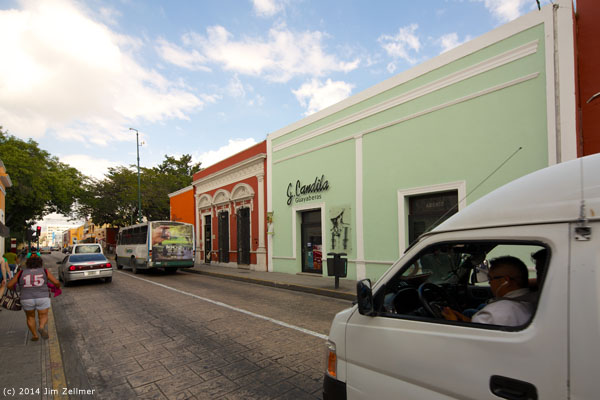Driving from New York to Kansas City with Harvey has not only been fun and a visual feast, it’s also been an education in his family’s illustrious history, in which the El Tovar Hotel featured prominently. Situated a few steps from the edge of the Grand Canyon, it is probably the shiniest and most famous jewel in the crown, or rather string, of hotels, restaurants and shops established by Fred Harvey, Steve’s great-great grandfather.
Frederick Henry Harvey was born in England in 1835 and became a naturalised American soon after landing on Ellis Island at the age of 17. Intelligent, capable and possessing a furious work ethic, he started out as a simple “pot walloper” (dishwasher) in a New York restaurant and grew to preside over a mighty hospitality empire, revolutionising the way Americans travelled, ate and went sightseeing. He became known as the “civiliser” of an, at the time, extremely uncivilised and very wild west. Harvey developed the first restaurant chain, the first “fast food” outlets (although he used only the freshest, choicest ingredients – as opposed to the highly processed cuisine we associate with the phrase today), the first tourism industry in the American southwest, the first all-female workforce and the first company merchandise and postcards. He also organised the first guided tours into “ethnic” (native American) territories in the southwest.
His empire stretched over 80 cities and towns in 17 states and, by 1948, 47 years after his death, the name Fred Harvey (his signature was the company logo) was attached to some 200 establishments, 29 of which were hotels. He drove a wedge of starched tablecloths, folded napkins and polished silverware into the rough-andready world in which cowboys and Indians were shooting it up and in which baked beans and rock-hard bread were considered a gourmet meal.
Today, however, Fred Harvey is no longer a household name, except among the people who live along the railroad routes he was instrumental in transforming, Hollywood musical buffs and the group of Harveyana enthusiasts who call themselves Fredheads.
It is the latter, as well as assorted members of the Harvey clan itself, that Steve and I are dashing to meet.
Monthly Archives: January 2014
Eiji Toyoda: “We learned it at the Rouge”
At a welcoming banquet in Japan in the 1980s, Ford Motor chairman Philip Caldwell received a memorably double-edged compliment. “There is no secret about how we learned to do what we do, Mr. Caldwell,” said the head of Toyota Motor, Eiji Toyoda. “We learned it at the Rouge.”
Toyoda was referring to Ford’s fabled River Rouge production complex in Dearborn, Michigan. In the early days of Japan’s rise, Ford and other American auto companies had been famously helpful to information-gathering Japanese engineers. Know-how gleaned at the Rouge evidently proved particularly valuable.
Similar stories can be told about the complacency of other U.S. industries in the face of emerging Japanese competition. Where Japanese industrial “targeting” is concerned, America never seems to learn.
Big Data + Big Pharma = Big Money
Need another reminder of how much drugmakers spend to discover what doctors are prescribing? Look no further than new documents from the leading keeper of such data.
IMS Health Holdings Inc. says it pulled in nearly $2 billion in the first nine months of 2013, much of it from sweeping up data from pharmacies and selling it to pharmaceutical and biotech companies. The firm’s revenues in 2012 reached $2.4 billion, about 60 percent of it from selling such information.
The numbers became public because IMS, currently in private hands, recently filed to make a public stock offering. The company’s prospectus gives fresh insight into the huge dollars – and huge volumes of data – flowing through a little-watched industry.
IMS and its competitors are known as prescription drug information intermediaries. Drug company sales representatives, using data these companies supply, can know before entering a doctor’s office if he or she favors their products or those of a competitor. The industry is controversial, with some doctors and patient groups saying it threatens the privacy of private medical information.
The data maintained by the industry is huge. IMS, based in Danbury, Conn., says its collection includes “over 85 percent of the world’s prescriptions by sales revenue,” as well as comprehensive, anonymous medical records for 400 million patients.
CES 2014: Audi Shows Off a Compact Brain for Self-Driving Cars
Hands free: The Audi Sport Quattro Laserlight concept car features compact sensor and computing technology that lets the car pilot itself.
Carmaker Audi showed off a book-sized circuit board capable of driving a car on Monday at the International Consumer Electronics Show (CES). Audi claims the computer, called zFAS, represents a significant advance in automation technology because it is compact enough to fit into existing vehicles without compromising design.
Several different Audi vehicles equipped with zFAS drove themselves onto the stage during the presentation, and a new concept car designed to showcase it was also introduced.
The car, called the Audi Sport Quattro Laserlight, is capable of what Ulrich calls “piloted driving” but betrays no outward sign of being different from a conventional vehicle.
Tom Wolfe’s California In the Golden State, the great writer first chronicled the social changes that would transform America
And without Wolfe, we would not understand California—or the California-ized modern world. At the time of his most frequent visits, the state was undergoing a profound change, one that affects it to this day and whose every aspect has been exported throughout the country and the globe. Both have become much more like California over the last 40 years, even as California has drifted away from its old self, and Wolfe has chronicled and explained it all.
It started by accident. Wolfe was working for the New York Herald Tribune, which, along with eight other local papers, shut down for 114 days during the 1962–63 newspaper strike. He had recently written about a custom car show—phoned it in, by his own admission—but he knew there was more to the story. Temporarily without an income, he pitched a story about the custom car scene to Esquire. “Really, I needed to make some money,” Wolfe tells me. “You could draw a per diem from the newspaper writers’ guild, but it was a pittance. I was in bad shape,” he chuckles. Esquire bit and sent the 32-year-old on his first visit to the West—to Southern California, epicenter of the subculture.
US senators push for Fannie and Freddie wind-down
US senators Bob Corker and Mark Warner on Wednesday made another push for their legislation to wind down Fannie Mae and Freddie Mac, saying the opportunity to resolve the ownership of the mortgage finance agencies bailed out during the financial crisis should not be squandered.
Their statements at a Financial Services Roundtable discussion on housing finance reform come as the Senate gears up to present a revised plan on Fannie and Freddie, which is aimed at pleasing both Republicans and Democrats.
The Senate banking committee’s leading Democrat and Republican, Tim Johnson and Mike Crapo, are in the advanced stages of putting together a compromise bill that borrows some aspects of the Corker-Warner legislation.
The debate over what to do with Fannie and Freddie had a new twist after Bruce Berkowitz’s Fairholme Funds in November proposed taking over operations of the bulk of the mortgage finance companies.
Mr Corker, a Republican, on Wednesday reiterated that the Fairholme plan proved there was an appetite for risk from the private sector, an issue that drew scepticism from critics of the Corker-Warner bill. White House officials have rejected the hedge fund proposal.
Carmakers keep data on drivers’ locations
A government report finds that major automakers are keeping information about where drivers have been — collected from onboard navigation systems — for varying lengths of time. Owners of those cars can’t demand that the information be destroyed. And, says the U.S. senator requesting the investigation, that raises questions about driver privacy.
The Government Accountability Office in a report released Monday found major automakers have differing policies about how much data they collect and how long they keep it.
Automakers collect location data in order to provide drivers with real-time traffic information, to help find the nearest gas station or restaurant, and to provide emergency roadside assistance and stolen vehicle tracking. But, the report found, “If companies retained data, they did not allow consumers to request that their data be deleted, which is a recommended practice.”
The report reviewed practices of Detroit’s Big Three automakers, Toyota Motor Corp., Honda Motor Co. and Nissan Motor Co. It also looked at navigation system makers Garmin and TomTom and app developers Google Maps and Telenav. The report, which didn’t identify the specific policies of individual companies, found automakers had taken steps to protect privacy and were not selling personal data of owners, but said drivers are not aware of all risks.
The agency said privacy advocates worry location data could be used to market to individuals and to “track where consumers are, which can in turn be used to steal their identity, stalk them or monitor them without their knowledge. In addition, location data can be used to infer other sensitive information about individuals such as their religious affiliation or political activities.”
Warnings for the U.S. military about innovation and the information age: The Pentagon looks like a minicomputer firm
VOICE
Warnings for the U.S. military about innovation and the information age: The Pentagon looks like a minicomputer firmHere I want to focus on Michael Horowitz’s warnings for the U.S. military in his book The Diffusion of Military Power. They include these:
“The information age may portend a much greater level of risk for U.S. conventional military superiority than some previous authors have envisioned.”
Don’t get too comfortable just because you enjoy current dominance. Horowitz cites the example of Digital Equipment Corporation, which was a power in minicomputers, but failed to understand the emergence of the personal computer market. It had the resources, but lacked the imagination, and so failed to deal with changes in the environment — I would say a bit like our national security leaders in September 2001.
A great danger, especially for mature organizations such as the U.S. military, is investing in “incremental improvements to the last great thing, rather than the next great thing.” So don’t confuse innovations that enhance your current way of doing business with innovations that may require a new way of doing business — but may also produce much greater gains.
2014 Sleeper Ideas
Instead of market predictions, I asked people for their best “sleeper ideas” for 2014. A sleeper idea is something that few people see coming. It’s a little followed idea that suddenly goes mainstream.
In 2013, few people were talking about 3D printing and Bitcoin in January. Yet everyone was at the end of the year.
So when I approached people for this year’s list, I simply said, “give me your top 3 “sleeper ideas”… they could be a public company (to go up or down), a private company, or a trend or other type of idea.
In order to get the best collection of “sleeper ideas,” I knew we had to approach more than just traders. Therefore, you’ll notice that the respondents this year come from tech, venture capital, hedge funds, as well as trading.
My hope when I started compiling these lists three years ago is that we would all learn from each other sharing our thoughts together. I think this year’s collection of ideas – from 55 of some of the smartest people I know — is the best yet and I want to thank each participant for taking the time to look forward and take their best shot at guessing which ideas are ready to shine in 2014. Here they are (in no particular order):
Pemex Perspective

Sydney. Vienna. Paris. Santa Cruz. Twin Valley. Charlotte. Johannesburg. San Diego. New York. Home to just a few of the fellow travelers I met while driving through the Yucatan Peninsula recently. Travel is a blessing to be savored.
But it was the Pemex gas station attendant whose friendly Spanish and English words remained with me as I queued with paperwork to return my rental car.
Pemex, Mexico’s national oil company, will soon lose its monopoly status likely changing their auto service culture.

I pondered this while visiting several Pemex facilities over the past few weeks. Not that I had an opportunity to choose other brands, much less price shop petrol. I noticed just one non-Pemex station during our 1360km journey.
I often saw full service attendants standing next to fuel pumps when arriving at a Pemex station. In one case, a bit of competition broke out as our non-swift Nissan rental pulled into the station. Two attendants waved and urged me to choose their pump. I chose the left pump.

The attendants sometimes wash your windshield (mosquito detritus) unprompted, though in larger cities, street entrepreneurs, as in the USA, dart between cars when stopped at an intersection and do the job using a presumptive close.
In all cases, I was urged to pay cash.
We further managed to communicate our need for air in the tires, twice.
One of the attendants responded warmly to our somewhat serviceable Spanish. He mentioned (Spanish & English) with a big smile that while working in a US hotel in 1970, “no one spoke Spanish, no one knew anything about our culture”. “Today, many people speak Spanish, people love our food, culture, the salsa“.
He warned us to make sure that Pemex attendants start the petrol pump at 0 and wished us a joyous journey.

Full service gas station nostalgia explored the deeper recesses of my mind, bringing back memories of a largely lost business. Riding with parents and grandparents while they filled up generally included a bit of time sharing the latest with the attendants while they looked over the car. Full service stations fueled your car, washed your windshield, checked the engine oil and tire pressure. These stations often performed maintenance as well.
In many countries fuel stops today serve as an appetizer for 7-11 style retail businesses featuring a plethora of high margin fast food and road related products.
It had been too long since I visited Mexico. Our journey could not have been more interesting, relaxing and enjoyable. Where might our Pemex oracle might find himself in ten years time?
Related: Daniel Yergin: Behind Mexico’s Oil Revolution.